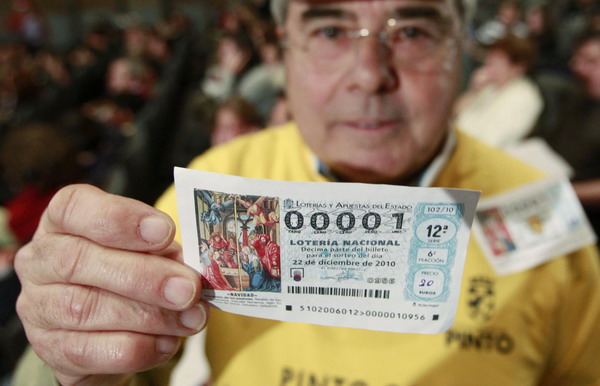Photos
Spanish Christmas lottery hands out $3 billion
Updated: 2010-12-24 09:57
(Agencies)
MADRID - Spain's beloved Christmas lottery sprinkled 2.3 billion euros ($3 billion) in holiday cheer across the country Wednesday, handing out winnings eagerly welcomed by a nation facing 20 percent unemployment.
One of the most awaited days of the year in Spain served up merry moments for people struggling to make mortgage payments and pay bills, or those seeking jobs. One lottery vendor said he had hired a medium to lure good luck.
Tax-free winnings range from the face value of a 20-euro ($26.31) ticket - in other words, you get your money back - to a top prize of 300,000 euros ($394,650).
The sweepstakes, which goes on for three hours, informally ushers in the Christmas season. Many Spaniards spend the day glued to TV sets, radios and computers, waiting to see if they are among the lucky. People often team up to buy shares of tickets sold by bars, sports clubs and business offices.
One bar in Palleja, a town near Barcelona, sold 600 of the top-prize tickets - that top-fetching number was 79250 - worth a cool 180 million euros ($236.8 million). Its owner, Jose Antonio Maldonado, was ecstatic over being able to help people in need during hard economic times. He sprayed a bottle of sparkling white wine in the air as a jubilant crowd roared.
"I know a lot of people who are drowning in the economic crisis and who bought a ticket in my bar. I feel like Robin Hood," he said. "In my entire life I have never cried as much as I did this morning."
In Alcorcon, a town just outside Madrid, lottery office manager Augustin Rubia said he hired a medium to cast a magic spell over his outlet, and set up altars outside with religious statues, candles and tarot cards, and it all worked: he sold 10 top-prize tickets to the tune of 3 million euros.
"The idea was to lure positive energy," Rubia told reporters, adding that all the winners are working-class people.
In Cerdanyola del Valles, another town near Barcelona, unemployed worker Fernando Sanmartin hit it big with 79250 the very day his 900-euro ($1,200)-a-month jobless benefits ran out, the newspaper El Mundo reported, without saying how many tickets he had bought. Sanmartin said he would use the money to remodel his kitchen and give some to his three children.
The government agency that runs the lotteries, known as LAE, usually diverts to prize money about 70 percent of the total amount that people gamble, and keeps the remaining 30 percent.
Children from a Madrid school that used to be a home for orphans pick small wooden balls bearing the winning numbers and prizes out of two giant golden tumblers, and sing them out in a time-honored tune known to every Spaniard.
To complicate things further - and ensure the money trickles down as much as possible - each number appears on 1,950 20-euro coupons.
This year tickets bearing the number 79250 were sold in the Madrid and Barcelona areas, Alicante in the east and other cities ranging from the Basque region in the north to Tenerife in the Canary Islands. The most commonly won amount for a 20-euro coupon is 100 euros ($131.55).
In lottery-crazed Spain - there are easily a dozen others beside the Christmas one - sales of El Gordo tickets remained stable from last year despite the country's severe economic woes.
Spain is struggling to emerge from nearly two years of recession triggered by a burst real estate bubble. It has slashed public sector wages, frozen retirement pensions and raised VAT sales taxes in a bid to convince markets it is not heading toward a bailout like Greece and Ireland.
On Tuesday, Spain's Parliament passed a 2011 austerity budget by a razor-thin margin, saving embattled Prime Minister Jose Luis Rodriguez Zapatero his job.
Spaniards are traditionally superstitious about picking their lottery numbers and this year was no exception. The number 11710 sold out in just two hours. The number was symbolic of Spain's World Cup triumph in South Africa on July 11, 2010.
E-paper

Ear We Go
China and the world set to embrace the merciful, peaceful year of rabbit
Preview of the coming issue
Carrefour finds the going tough in China
Maid to Order
Specials

Mysteries written in blood
Historical records and Caucasian features of locals suggest link with Roman Empire.

Winning Charm
Coastal Yantai banks on little things that matter to grow

New rules to hit property market
The State Council launched a new round of measures to rein in property prices.





